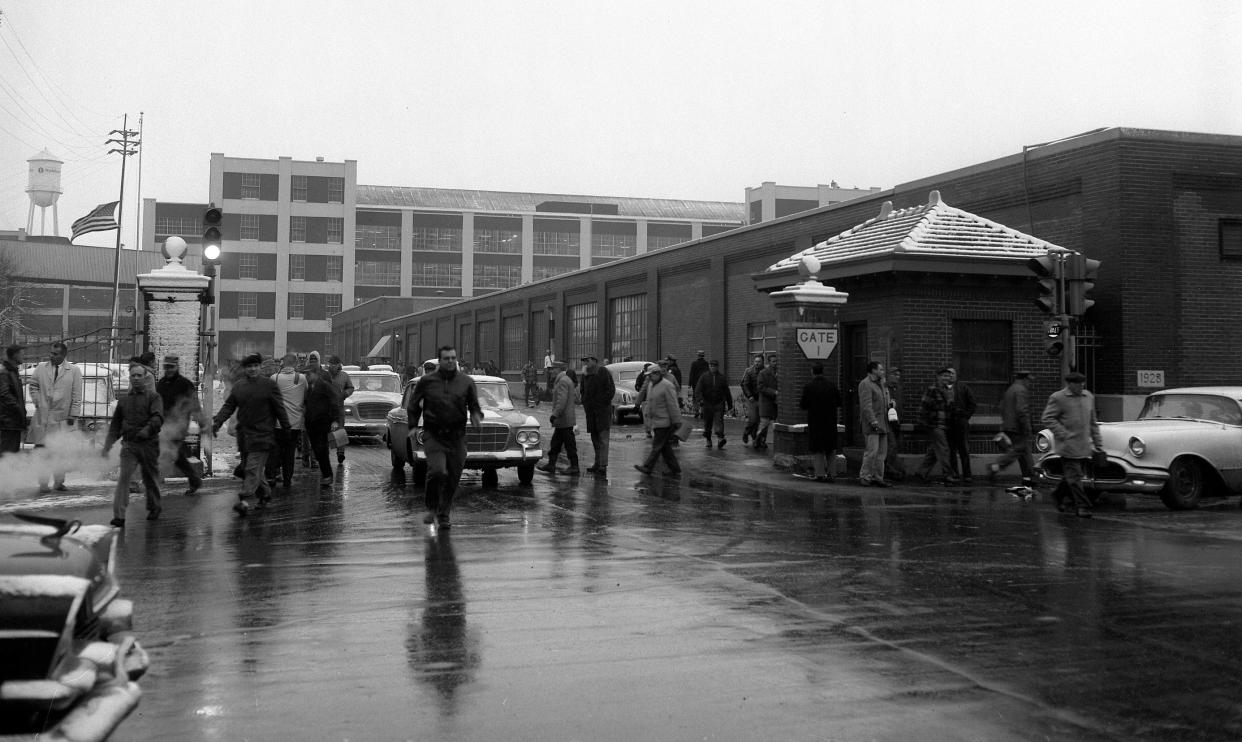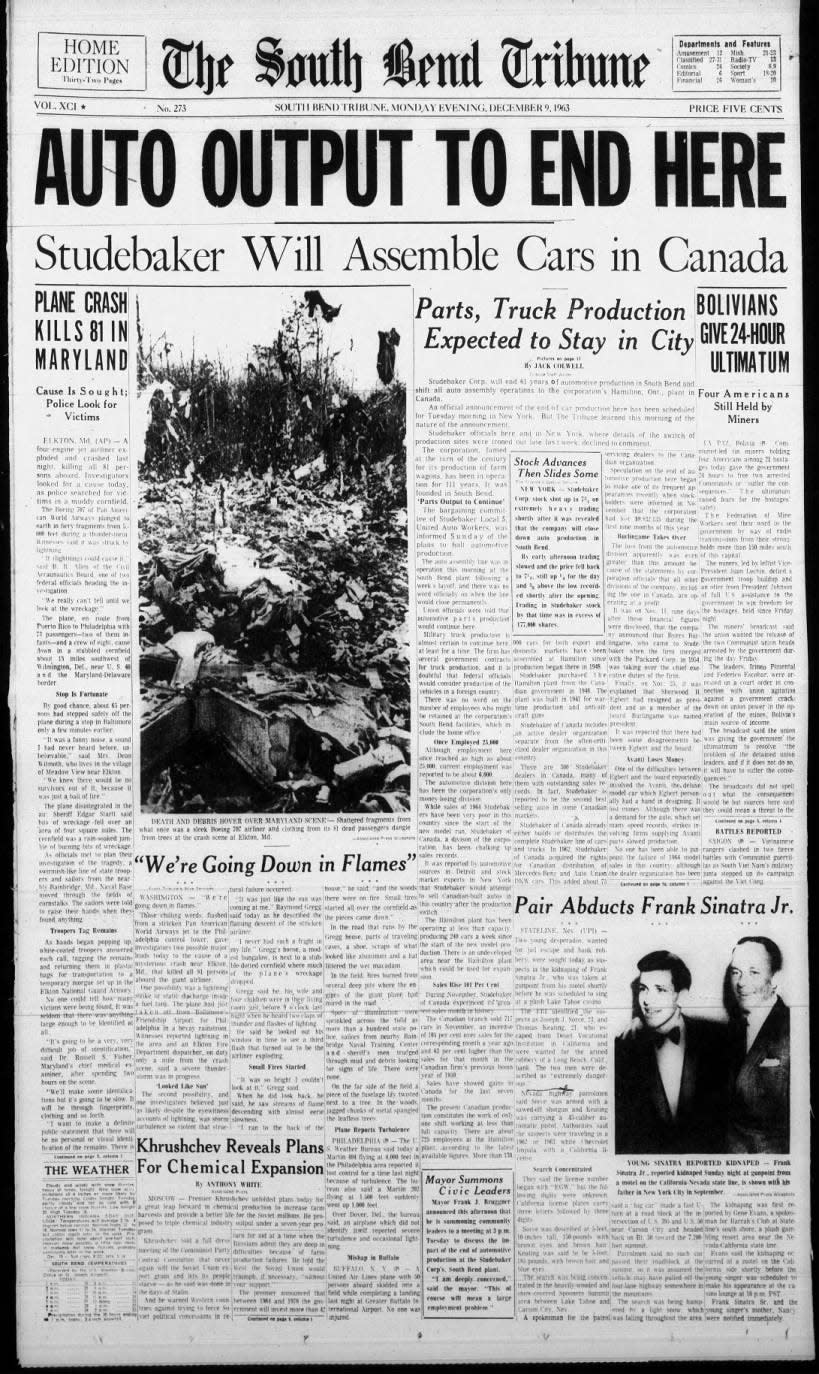How a young reporter broke the story of Studebaker leaving South Bend on Dec. 9, 1963

Copies of The Tribune streamed off the presses on that cold, gray Monday afternoon 60 years ago, on Dec. 9, 1963, carrying my front-page story breaking the news about the Studebaker Corp., the automaker founded as a Blacksmith shop in South Bend in 1852.
“AUTO OUTPUT TO END HERE”
That was the banner headline for news that Studebaker wouldn’t confirm and workers leaving their jobs at the end of their shift that afternoon didn’t want to believe.
But it was true. I wouldn’t have written it and The Tribune wouldn’t have printed it if there was doubt.
We saw no reason to hide the truth in South Bend so that Studebaker officials could complete machinations with their stock holdings before an announcement they had scheduled for the following morning in New York.
What would have happened if my story about the closing had been wrong? Well, my journalism career would have been far shorter. But I never had any doubt about the accuracy. The sources were many, solid and in labor, management and the finance world — even one in Canada.
I’m often asked how I, then a young general assignment reporter, relatively new to the paper, was the one to write the story.
Jack Powers, the managing editor then, was concerned that business writers had been too close to Studebaker management and public relations people, writing what was given and not digging for facts beyond glowing reports.
There had been continuing differences between management and United Auto Workers Local 5, and Powers knew the paper, so often presenting only the management side, had developed an anti-union image.
He told me to dig into what was really happening and play no favorites in coverage. At one point on another story, improved relations with labor led to a background meeting in Washington with Walter Reuther, the legendary labor and civil rights leader who was president of the UAW.
So, as sources, always off the record for obvious reasons, told of Studebaker management changes signaling a possible closing, I concentrated on that.
The weekend before the closing story, I was on the phone constantly, talking with sources who told of what was coming and when. By early Monday morning, I knew of a secret Sunday meeting of top management and labor officials at which details of the upcoming Tuesday announcement were presented.
One final key source Monday morning was a prominent stock broker who told of important people connected with Studebaker seeking quietly to sell their stock before a Tuesday announcement in New York of auto production ending in South Bend. (They made the wrong move. Studebaker stock initially sold higher after announcement of the closing of the old South Bend plant.)
On that Monday morning, I was summoned to the publisher’s office, not a place young reporters usually visit.
Publisher Franklin D. Schurz and Powers were there. They went over everything with me. All the sources. All the details.
None of the sources would agree to be quoted by name. They had been sworn to secrecy or feared retaliation if quoted. So, in any story, the risk was ours. We couldn’t blame any error on some named source.
The Tribune was an afternoon paper then. And a decision had to be made by mid-morning on whether to run the story.
Finally, the publisher asked Powers, “Are you satisfied we should go with it?”
“Yes,” Powers said.
And Mr. Schurz — I always called him “Mr. Schurz” — told me to write it.
I did:
“Studebaker Corp. will end 61 years of automotive production in South Bend and shift all auto assembly operations to the corporation’s Hamilton, Ont., plant in Canada.
“An official announcement of the end of car production here has been scheduled on Tuesday morning in New York. But The Tribune learned this morning of the nature of the announcement.”
With the story breaking, Studebaker confirmed it later that day.

For those workers ending their shift, it wasn’t just leaving their jobs that afternoon. Their jobs were leaving. Forever. Gone. As were the pensions they had expected.
While employment at the automaker was down to 7,500, far from the more than 20,000 workers at a point in defense production during World War II, Studebaker still was a major industry. Many more thousands were still on layoff then, hoping to be called back when, as they believed, new models, especially the high-performance Avanti, would be selling successfully.
That gray day was to be a dark day also for thousands of others working in automotive-related jobs or providing services and merchandise for Studebaker workers — suddenly former workers left without jobs and means to pay for services and merchandise.
The impact would hit merchants selling clothing, shoes, groceries, furniture … just about anything. It hit restaurants, motion picture theaters. It hit the whole community with lasting effects for decades.
We certainly didn’t take lightly the responsibility to present accurately the news of the demise of auto production.
Was I happy that my story about Studebaker ending production here was confirmed?
No. I knew the story was true. So, I wasn’t concerned with official confirmation. And I certainly was not happy about how the bad news would affect the city and so many lives.
Jack Colwell is a columnist for The Tribune. Write to him in care of The Tribune or by email at jcolwell@comcast.net.
This article originally appeared on South Bend Tribune: Recalling Dec. 9, 1963: the day Studebaker announced it was leaving
